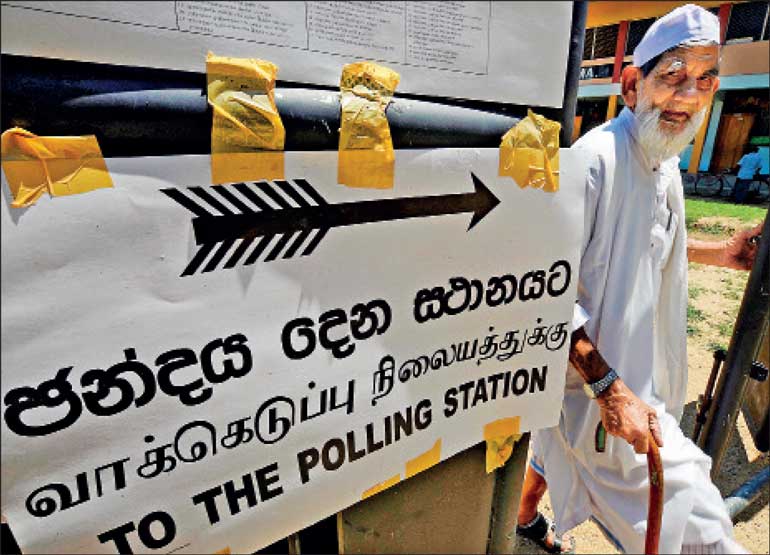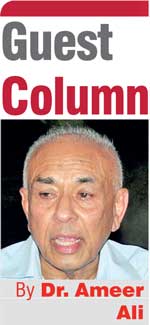Thursday Feb 12, 2026
Thursday Feb 12, 2026
Tuesday, 23 January 2024 00:01 - - {{hitsCtrl.values.hits}}

Unless that political culture is removed and replaced with a secular democratic culture there is no
hope for ethnic and religious minorities to live in Sri Lanka with dignity, freedom and justice
– Pic by Shehan Gunasekara
To the two minorities therefore the choice is starkly evident. Either they vote for a leader and party that advocates system change to bring about a new socio-economic order grounded in integrational politics, secular democracy and corruption free governance or vote for a champion of the old system that has kept the nation divided since independence, immiserised the economy and created a class of political parvenus thriving on public wealth. Alternatively, if the Tamils decide to boycott the election that would be suicidal
 It has taken 75 years of self-destructive communal politics to bankrupt Sri Lankan economy and leave each of the ethnic and religious minorities to fight for a piece from a shrinking cake. True, corruption, nepotism, wasteful investments, riots, civil war, natural disasters and so on had contributed to this bankruptcy. But at the bottom of all this is the diabolic political ideology of Sinhala Buddhist majoritarianism, which highjacked the British gifted parliamentary democracy, and allowed promoters of that ideology to run governments without any accountability and with scant regard to the wellbeing of minority communities.
It has taken 75 years of self-destructive communal politics to bankrupt Sri Lankan economy and leave each of the ethnic and religious minorities to fight for a piece from a shrinking cake. True, corruption, nepotism, wasteful investments, riots, civil war, natural disasters and so on had contributed to this bankruptcy. But at the bottom of all this is the diabolic political ideology of Sinhala Buddhist majoritarianism, which highjacked the British gifted parliamentary democracy, and allowed promoters of that ideology to run governments without any accountability and with scant regard to the wellbeing of minority communities.
The only accountability governments faced was when they went to the polls. The voters of course had periodic opportunities to throw out bad governments and install a new one expecting the newcomer to solve problems inherited from the old and lead the country along the path towards prosperity and glory. That exercise was repeated several times but only ended up in changing pillows to cure headache without realising that the headache was just a symptom of a deadly cancer requiring lifesaving surgery. Today Sri Lanka is in need of a lifesaving surgery or system change in political parlour, which means the ideological edifice of Sinhala Buddhist majoritarianism must be removed and replaced with the ideology of secular democracy and responsible governance. This is the primary choice voters would face at the next election, be it presidential, general or otherwise.
The two minorities, Tamils and Muslims, accounting for nearly one third of total population had been the victims, although to different degrees, of ethnonationalist governments, which deliberately designed and executed policies of discrimination to deny the minorities their due share in both the struggle for and fruits of national development. While the Tamils decided to fight against this discrimination peacefully at first and violently later and dragged the country into an unaffordable long and bloody civil war, Muslims on the other hand used their commercial acumen to practice what came to be known as politics of pragmatism. Their community leaders bargained and won from all ethnonationalist governments preferential treatment to Muslims in return for that community’s support. That strategy however, remained profitable only as long as the Sinhalese feared an existential threat from Tamils, but once that threat evaporated after the civil war in 2009 Muslim support became unnecessary to maintain majoritarian rule. As a result, the future of these two communities looks bleak so long as the present system of politics and governance are allowed to continue. It was that political culture which ultimately decided how the country should be governed and it was that culture which led this country’s economy to bankruptcy. Therefore, unless that political culture is removed and replaced with a secular democratic culture there is no hope for ethnic and religious minorities to live in Sri Lanka with dignity, freedom and justice.
In response to the rise of Sinhala Buddhist majoritarianism the two minorities founded their own separate ethnonational parties, which only strengthened the political clout of their enemy. Although the leftists from the majority community offered a way out the two minorities jointly rejected them. Ultimately ethnic politics became the bane of this country and the poly-crisis is its outcome. This is why the next election is going to be one like no other. The choice facing all voters and particularly those from the two minorities is only one: to support either a leader and his/her party that want to preserve the ruling system which is moribund and corrupt and which cannot be improved by polishing its rough edges, or, to bring in a new system governed by principles of secular democracy in which all citizens of this country irrespective of their ethnicity, religion, cast or sex are treated as equals before law and their respective contribution to society and rewards for their contribution would be recognized or measured only in terms of merit and no other. Is there such a leader and party to choose from?
Of all the parties and their leaders vying to capture the presidency and government, only one – NPP and its leader Anura Kumara Dissanayake (AKD) – is calling for a “social revolution” to change the political culture, its mode of governance and its model of economic management, which together means a paradigm shift.
This is a revolutionary call to put it bluntly and is to be achieved not through bullets but through the ballot. Unlike in previous elections the coming one is going to take place in an environment of multiple
crises.
The economy of course is leading the pack but there are others such as education, health, environment, foreign relations, human rights violations, democratic freedom and so on, in all of which the two minority communities have been affected disproportionately.
The solution to minority problems has to be sought from within and not from without. This is at least one lesson the Tamil community must have learnt after 2009. Similarly, the Muslims also must realise that their concept of umma or universal Islamic brotherhood is only a slogan without substance. The latest proof of this is the current tragedy in Gaza.
It is time these two minorities forget about bargaining for special concessions and privileges from ethnonational parties of the majority community and consider seriously and support the hands of NPP that is determined to end 75 years of divisive politics with all its evils.
President Ranil Wickremesinghe (RW) an ageing old fox in politics and aspiring to recapture the presidency is talking about ethnic compromise without explaining what that means and how to achieve it, only to appease the Tamil community. He is also doing everything under his power to attract Muslim voters. From the time he let go with a slap on the wrist a Muslim parliamentarian who was caught red handed smuggling taxable items through the VIP lounge at Katunayake, to his most recent declaration in Jaffna that everything had been done to allow Muslims who were chased out by the LTTE to return to their vacated properties, and the handover of the controversial Punani University campus to another Muslim ex-parliamentarian in between, RW is casting his net wide to recapture the traditional UNP Muslim vote bank a substantial part of it has fallen under the control of SLMC and ACMC.
It is not clear yet how many would enter the fray to oppose RW except AKD if a Presidential Election were to be declared first. However, from a variety of opinion reckonings it appears that if the contest becomes a three or more-cornered fight AKD stands a good chance of winning. This is why there is a hectic number of meetings and discussions going on in secrecy and behind closed doors to make the contest a direct fight between RW and AKD. To that extent NPP has already won the contest. On that assumption the next presidential election could be expected to be one not between two personalities but between two political and economic orders, one representing an ageing and dying generation steeped in identity politics with its desire to retain the ethnonationalist paradigm, and the other representing a new and growing generation awakened by an integrated borderless world and craving to make integrational politics the basis for a new paradigm. That was made loud and clear at the aragalaya, which RW destroyed.
To the two minorities therefore the choice is starkly evident. Either they vote for a leader and party that advocates system change to bring about a new socio-economic order grounded in integrational politics, secular democracy and corruption free governance or vote for a champion of the old system that has kept the nation divided since independence, immiserised the economy and created a class of political parvenus thriving on public wealth. Alternatively, if the Tamils decide to boycott the election that would be suicidal.
(The writer is attached to Murdoch Business School, Murdoch University, W. Australia.)